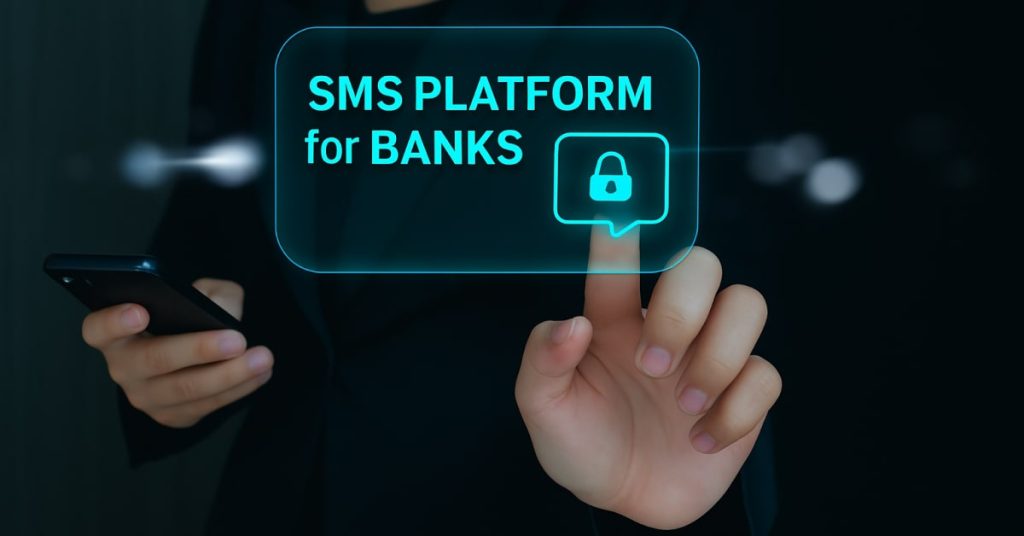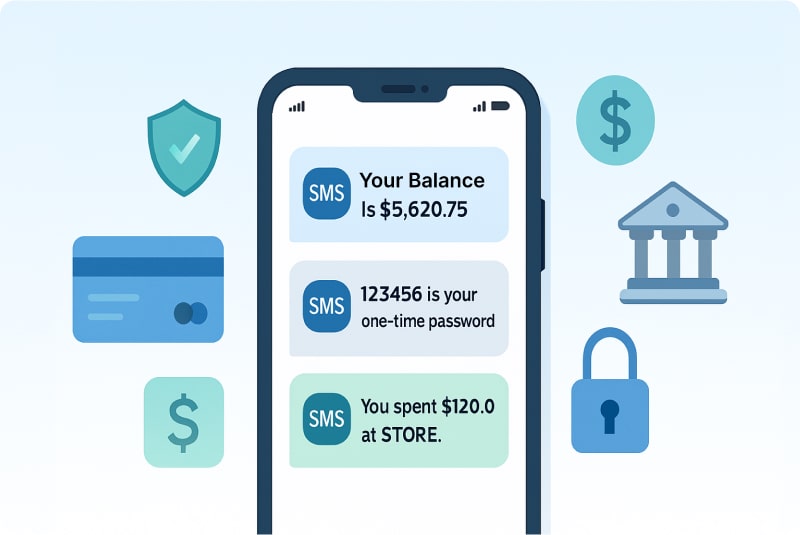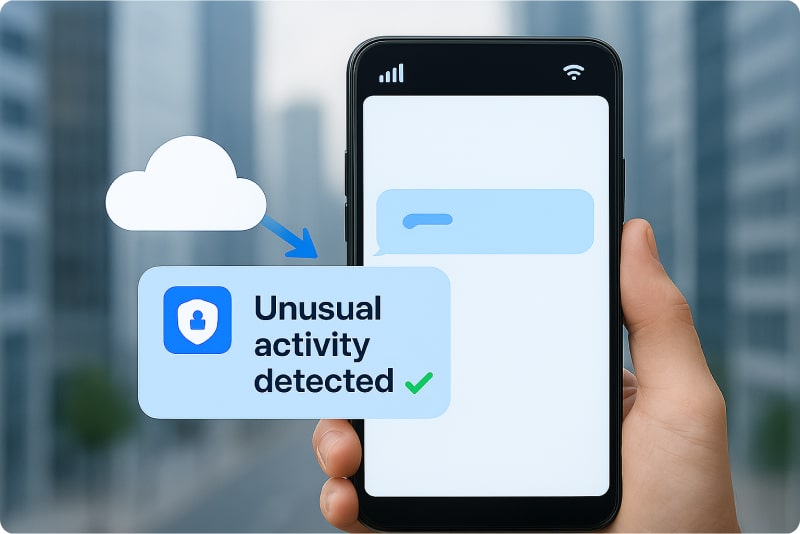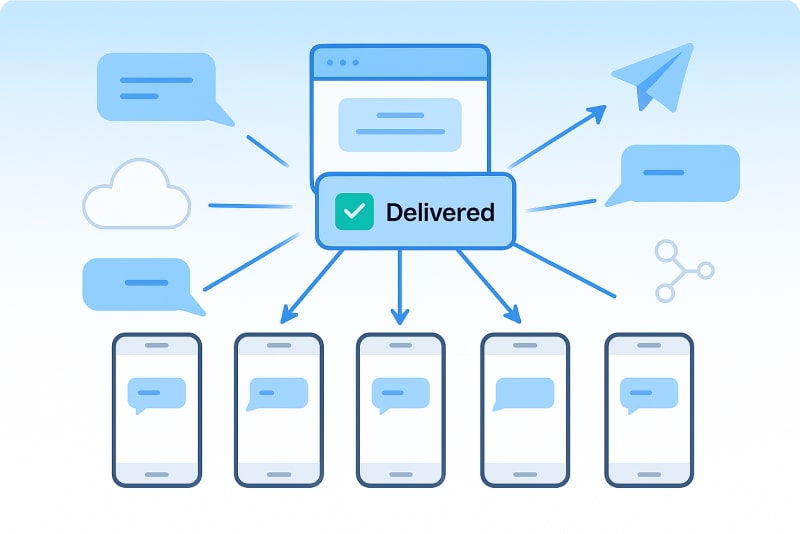
For SMS aggregators, tapping into the banking and financial services sector presents a high-value opportunity. However, it also underscores the need for SMS platforms for banks tailored to meet their stringent banking requirements. Real-time communication is an absolute essential in the fast-paced world of banking and finance. SMS serves as a reliable and preferred communication channel for banks. It’s widely used to alert customers about transactions, send OTPs for secure logins, and notify users about loan status updates.
As an aggregator, your ability to serve this niche hinges on choosing a robust, scalable, and feature-rich SMS platform. Offering a standard SMS solution isn’t enough; you need a platform that aligns with the compliance and operational expectations of modern banks.
In this guide, we’ll explore what truly makes an SMS platform bank-ready, with key insights and considerations tailored for aggregators. Overall, it will help you understand the critical components of a robust, bank-grade SMS infrastructure.
What is an SMS Platform for Banks?

An SMS Platform for banks is a messaging system that enables financial institutions to send and receive text messages to customers securely and efficiently. Typically, these platforms are designed to support bulk messaging, transactional alerts, marketing campaigns, two-way messaging, and real-time notifications.
You can think of an SMS platform as a communication system that connects a bank’s core systems, like internet banking, CRM, and payment gateways, with mobile networks. This connectivity ensures timely, personalized, and secure transmission of SMS messages.
Did you know: In regions with limited internet or app penetration (e.g. parts of APAC), SMS remains the most reliable channel: 30% of banking-sector communications rely on SMS opt-ins, and the majority prioritize it for critical alerts.
Types of SMS Used in Banking
Primarily, banks use A2P and P2A messaging to connect with customers. Let’s break these down for you:

A2P (Application-to-Person)
This is the most common type of messaging used in the banking sector. These messages are sent from the SMS software or platform to individual customers. A2P messaging supports automation and is therefore perfect for sending time-sensitive and secure information to customers.
P2A (Person-to-Application)
P2A messaging is used in the banking and finance sector for interactive services. Here, messages are sent by a person (such as a customer) to an application, typically initiated via shortcodes or long codes. Unlike A2P, the P2A messaging enables 2-way engagement. One of the common examples includes SMS banking commands – texting “BAL” to get the balance.
Why Banks and Financial Services Need SMS Communication?

The digitization in the banking ecosystem has raised customer expectations – they now expect instant, secure, and personalized communication. That’s why an SMS platform becomes an essential system to ensure timely, reliable, and compliant messaging with customers.
Instant Customer Communication
In today’s fast-paced digital world, banking decisions are to be made in real-time. Whether it’s about authorizing a transaction or receiving fraud alerts, banks need to send messages instantly to customers, even on basic phones that operate without the internet. Statistics reveal that “84% of consumers check their texts within 15 minutes of receipt, and 77% respond in that time frame”. This makes a compelling case for urgent banking communications.
Secure and Reliable Delivery
Banks and financial institutions deal with a lot of sensitive customer data. Over 76% of banks globally rely on SMS-based OTPs for two-factor authentication (2FA), driven by regulatory mandates like PSD2 and RBI guidelines. This means having a secure communication system is a must-have. SMS platforms with built-in encryption, message routing control, and compliance tools ensure enterprise-grade security.
Boosting Customer Engagement
Banks often need customer feedback, confirm transactions, and resolve customer queries. This creates the need for a system that supports two-way communication, and SMS platforms with A2P messaging support are the ideal choice. 46% of financial institutions have increased their SMS spending for alerts, transaction messaging, and security updates due to its ROI and engagement efficiency. Source- G2
Multi-Channel Campaigns
SMS platforms are an excellent tool when it comes to running multi-channel campiagns from a single interface. Several advanced SMS platforms integrate multiple channels such as WhatsApp and email to help financial institutions manage all their campiagns from the same dashboard. Banks using SMS alerts to prompt email interactions saw email open rates increase from ~4.5% to over 21%, demonstrating SMS’s role in multichannel engagement.
Increase Operational Efficiency
Communications like loan reminders, EMI alerts, etc., are repetitive tasks that can be automated with the use of SMS platforms. This helps banks in saving time, reducing human error, and keeping customers informed 24/7.
Real-Time Reporting & Compliance
SMS platforms are equipped with tools that enable banks to track message delivery, engagement, and response rates in real time. This is extremely crucial for audits, customer service, and optimization.
Use Cases: How Banks Use SMS Platforms
SMS is used as a core messaging tool in the banking sector due to its immediacy, reliability, and reach. Let’s explore some of the most impactful use cases:
Transaction Alerts
Transactional alerts are generated and sent to customers via SMS platforms whenever the money is debited, credited, or a change in account balance occurs. Example – $ 5,000 has been debited from your A/C ending in 1234. Avl Bal: $10,650.
One-Time Passwords (OTPs)

These passwords are sent by banks to customers in real-time during logins and transactions to verify user identity. OTPs sent by SMS platforms enable 2-FA and reduce fraud in online and mobile banking. Example- Your OTP for login is 892344. It is valid for 5 minutes. Do not share it with anyone.
Loan & EMI Reminders
Banks often make use of SMS platforms to remind customers about upcoming loan installments and overdue payments. This helps in reducing the number of missed payments and improves repayment rates. Example- Reminder: Your EMI of ₹7,892 for Personal Loan A/C ending 1234 is due on 25 July. Pay on time to avoid penalties.
Fraud Notifications

Whenever there’s an unusual or suspicious account activity, banks intimate customers about the same by sending SMS alerts. This helps in minimizing potential damages from the fraud and also builds trust and improves customer safety. Example- Alert: A login attempt was made from an unrecognized device. If this wasn’t you, call our helpline immediately.
Customer Support & Surveys
SMS platforms are used by financial institutions to keep customers informed about their ticket status and even gather feedback through SMS-based forms. Example- Your support ticket #58392 is now resolved. Reply with 1 to rate our service, 2 if you need more help.
Marketing & Promotions
Banks conduct promotional and marketing campiagns through SMS platforms, promoting new banking products, informing customers about limited-time offers, and even service upgrades. Example – Exclusive: Get up to $X personal loan instantly. Apply via NetBanking or visit your nearest branch.
Choosing the Right SMS Platform for Banks

In the highly sensitive banking sector, an SMS platform needs to do more than just send messages – it should ensure reliable, secure, and at-scale delivery of SMS messages. If you are an SMS aggregator or a reseller aiming for clients in the banking sector, then make sure to consider the following points before finalizing an SMS platform:
Can the platform scale?
There’s no denying the fact that banks handle millions of customer interactions on a daily basis. This means your SMS platform should be able to scale effortlessly as you onboard new clients or banks and run high-volume messaging campiagns. Therefore, look for:
- Bulk messaging capabilities
- Ability to handle spikes in traffic without failure
- Support for both transactional and promotional messaging
Is the platform secure and compliant?
It is important to note that security and compliance today are not optional. Your banking clients are definitely going to ask for these because they operate under strict data privacy laws. Therefore, look for a platform that:
- Complies with GDPR, PCI DSS, or ISO 27001
- Offers secure message encryption and user authentication protocols
Does it offer reliable delivery and uptime?
Real-time operations can make a world of difference in the banking sector. To ensure your clients gain the maximum benefit from your platform, look for an SMS solution that:
- Offer high throughput and 99.9%+ uptime
- Granular and real-time delivery reports
Is the platform flexible and easy to integrate?
Often, SMS platforms are needed to integrate with banking cores and CRMs. Therefore, you’ll need a system that:
- Provides clean APIs, SDKs, and sample code
- Offers smooth onboarding for both you and your clients
Does it offer strong support and SLAs?
To provide a dependable service to your clients, you first need a platform vendor that offers responsive support. It is because the credibility of your service depends on this. So look for these:
- 24/7 support available?
- Are SLAs in place for issue resolution and uptime guarantees?
Does the Platform offer essential features?
-
User-Friendly Interface: Intuitive dashboard for easy campaign management.
-
Telco-Grade Solution: High TPS with scalable server architecture for enterprise-level campaigns.
-
Bare-Metal or Cloud: Option to deploy on dedicated on-premise servers or in the cloud.
-
Licensed or Hosted Model: Choice between owning the platform or using a hosted version.
Does it support advanced features for your banking clients?
Imagine yourself managing multiple banking clients. What would help you stay at peace and enjoy business growth? Certainly, a platform without operational complexity, supporting multi-client setup, while maintaining control, security, and brand identity. Check for the following features to serve banking clients confidently and professionally.
- Integrated International Payment Gateways
- WhatsApp Campaigns + Traditional SMS
- SIGTRAN Protocol Support
- HLR Lookup & MNP Dipping
- MCC-MNC Based Rate Management via Email Automation
Conclusion
Financial institutions consider SMS a non-negotiable tool, with over 90% of banks likely to deploy texting platforms, recognizing their role in building trust, especially during critical alerts.
The universality, reliability, and offline reach are what truly make SMS the cornerstone in the banking and finance sector. An SMS platform acts like an intelligent and reliable communication bridge between banks and their customers. Clearly, the robustness of your SMS platform determines your success. So, make sure that your platform delivers much more than just SMS delivery. Bank-grade security, instant message delivery, two-way engagement, and unshakable reliability – choose a platform that does it all.
Within the banking sector, every communication that happens should work seamlessly, securely, and at scale. REVE offers a powerful, secure, and banking-ready SMS platform that can make a strong foundation for your service offering. It is designed to make life easier for SMS aggregators like you – enterprise-grade built-in compliance, seamless integrations, and advanced features.
In essence, the role of aggregators in the banking sector is to bridge the gap between messaging infrastructure and banking-grade communication. Book a demo or contact us to explore and learn how REVE SMS can help you grow your aggregator business.
Frequently Asked Questions
How is a banking SMS platform different from regular SMS services?
Banking SMS platforms come with banking-grade security, compliance, and system integration capabilities. These platforms are built to support sensitive communications like OTPs, transaction alerts, and fraud notifications.
Can SMS platforms handle bulk messaging for campaigns?
Yes, modern-day SMS platforms are designed to handle high-volume messaging efficiently. This capability makes them ideal for sending promotional campaigns, announcements, and service updates to thousands or even millions of customers simultaneously. And guess what? It comes with delivery tracking and scheduling features as well.
What features should an SMS platform for financial services offer?
Typically, an SMS platform for banks should include secure APIs for integration, real-time message delivery with reports, two-factor authentication, or 2FA support, Multilingual messaging, Advanced routing, Automated alerts, and campaign management.
Is technical expertise required to manage an SMS platform?
It’s not necessary to have technical expertise to manage an SMS platform. Modern-day systems are designed in such a way that anybody with minimal IT knowledge can set up and use these platforms. Thanks to the user-friendliness, automation tools, and support services that make it easy for non-technical users to manage campaigns and monitor SMS delivery.
Are SMS platforms in the banking sector used only for OTPs?
Not at all, while OTPs are a widely popular use case of SMS in banking, it also used for fraud alerts, loan reminders, marketing campaigns, account updates, and two-way customer service.
What is TPS in an SMS platform, and what is its importance?
TPS stands for Transactions Per Second. It indicates the number of messages a platform can process. Generally, higher TPS is considered crucial for the timely delivery of sensitive information such as OTPs and alerts.
Do SMS platforms support two-way communication?
Several SMS platforms like REVE SMS offer two-way messaging that can help banks to interact with customers via responses to alerts, feedback forms, surveys, or support-related inquiries. This enhances user engagement and service quality.






















